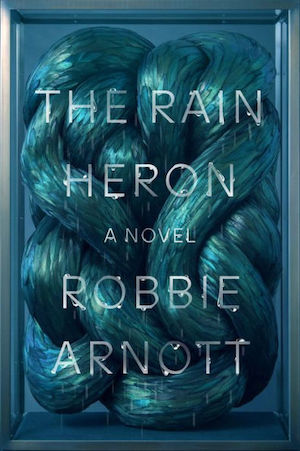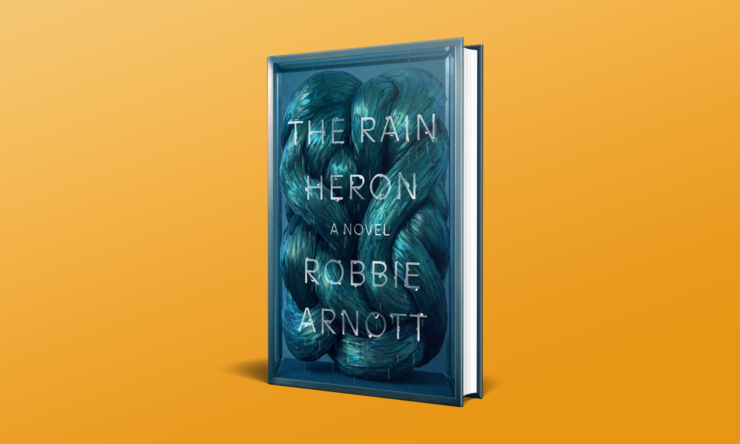Two women embark on a grueling quest in search of a legendary creature called the rain heron—a mythical, dangerous, form-shifting bird with the ability to change the weather.
We’re thrilled to share an excerpt from Robbie Arnott’s The Rain Heron, an exploration of human resilience, female friendship, and humankind’s precarious relationship to nature—available February 9th from FSG Originals.
Ren lives alone on the remote frontier of a country devastated by a coup d’état. High on the forested slopes, she survives by hunting, farming, trading, and forgetting the contours of what was once a normal life. But her quiet stability is disrupted when an army unit, led by a young female soldier, comes to the mountains on government orders in search of a legendary creature called the rain heron—a mythical, dangerous, form-shifting bird with the ability to change the weather. Ren insists that the bird is simply a story, yet the soldier will not be deterred, forcing them both into a gruelling quest.
Spellbinding and immersive, Robbie Arnott’s The Rain Heron is an astounding, mythical exploration of human resilience, female friendship, and humankind’s precarious relationship to nature. As Ren and the soldier hunt for the heron, a bond between them forms, and the painful details of Ren’s former life emerge—a life punctuated by loss, trauma, and a second, equally magical and dangerous creature. Slowly, Ren’s and the soldier’s lives entwine, unravel, and ultimately erupt in a masterfully crafted ending in which both women are forced to confront their biggest fears—and regrets.
The throbbing returned, at first in pumps, then in waves. Ren kept applying the antiseptic cream, but the tube soon ran out, and the torn lips of her wound turned scarlet, swollen, hot to touch. Yellow-white pus began oozing from the depths of her muscle, carrying an oily, sick scent.
Three days after she ran out of cream, Ren tried to unwrap her bandage, only to find that the drying pus had fused it to the wound. She lay by the creek, submerging her arm in the water until the gauzy fabric unglued itself from her flesh. Thick threads of pus swam away down the stream. Her wound rang out with pain and rot.
She could have gone to the village to beg for more antibiotics, but she knew the soldiers would be patrolling the lower slopes. She had no way of contacting Barlow, and even if she could, she didn’t want to. They knew his son had come to see her; any further connection would only bring him harm. Without medicine, she should at least have rested, but her stores of food had dwindled dangerously—all she had left were a few half-grown, unharvested vegetables and a handful of stale nuts. So, despite the infection, despite the mind-blanking stabs that now shot through her left side whenever she made even a slightly rough movement, she got up each day and went foraging.
Buy the Book


The Rain Heron
Every movement was awkward, every chore a fresh agony; every choice was a compromise between what she could manage and what would keep her alive. Gathering nuts, mushrooms, herbs and fresh pine needles was okay, but she’d never relied on these things for more than a third of her diet. Now she grabbed as much as she could, and while it was enough to feed her for a few days, she soon went through all the easily collectable food in the area. Checking traps was possible, but resetting them wasn’t; her arm couldn’t take the intricacy and strain her snares required. From her existing set-ups she managed to snag a few rabbits and a single fish, with no hope of catching any more.
Worse, her endeavours on the mountain were being sabotaged. At first she wasn’t sure of it—she thought her snapped snares and displaced fish gullies were caused by weather or animal interference. Then she returned from a brief outing to find her vegetable patch churned and smashed. Her zucchinis, potatoes, pumpkins and yams had been yanked out and stomped into the rocky soil beside the dark loam. She knelt, trying to reclaim as much edible material as she could from the boot prints, and saw tiny white granules littered through the remnants of the patch. A smell rose to her nostrils—a smell that carried scenes of her old life, of the beach, of a rusting breeze and crusting residue. They had salted her garden.
Wet rage welled up inside her, big, overwhelming, but not as big as the hunger aching in her gut—a hunger that drove her back into the forest.
After a half-hour of maddened searching, her movements not even hinting at quietness or stealth, she came across a patch of blackberries, the vines weighed down by dark fruit. She fell upon the bush, ignoring the thorns that pricked her fingers, her wrists, as she ripped the berries free and shoved them into her mouth. The rich flavour lanced her tongue. Blood raced through her veins, juice smeared at the corners of her mouth, and still she kept eating. For ten minutes she gorged, stopping only to burp and breathe, until finally she leaned back, dizzy and sick and full, to see that Lieutenant Harker was watching her.
She was propped against a tree, arms crossed. A thoughtful expression hung on her face—a sucking of the cheeks, a pinching of the brow.
I thought you would’ve found this bush days ago. We’ve known about it for a week.
Ren didn’t respond. Harker pointed at her wound.
That doesn’t look like fun.
Again Ren didn’t speak. The fruit was bubbling in her stomach. She had eaten too much, too fast. It had brought on a wooziness, which, coupled with the ever-present throb of her arm, made her want to close her eyes and lie down. Only Harker’s presence kept her upright.
Now she came closer. Ren could see a spray of freckles across her nose and cheeks: the work of the mountain sun, she thought, and then she was thinking of girls at the beach, of children, of sharp shells and rip currents and bird calls.
Let me help you.
Harker’s voice had lowered but her tone was the same, flat and neutral.
I don’t like doing this. We’ll fix your arm. We’ll leave.
She crouched down before Ren.
Just help us find the bird.
Ren pulled herself into a straighter sitting position.
I bet they think you’re too young.
Harker’s face remained still, touched only by the freckles.
They say it, don’t they? That you’re too young. And here you are. Up a mountain, chasing a fairy tale.
Harker stood up. If she was affected by Ren’s words, if anger or shame had crept across her face, Ren didn’t see it. Harker just smoothed her ponytail and stretched her arms high above her head, arching her back.
This ends when you let it.
Then she was gone, twisting back into the trees with that poise and deftness that somehow bordered on violence.
Five minutes later, Ren heaved herself to her feet, swaying and grunting, and began making her way home. It took much longer than usual, and though she was filled with the energy of the berries she was also battling the sickness they had awoken in her. She went slowly, pausing, sucking in deep breaths when.ever she felt like vomiting, not wanting to lose her meal. As she reached her clearing another wave of nausea washed through her, and she steadied herself against a tree. Fresh, pine-thick air filled her lungs, and the bile backed down her throat.
As she leaned, Ren realised that she could feel something foreign beneath her fingers. Where there should have been rough bark, she felt smooth wood and viscous stickiness. She turned to face the tree and saw a wide, neat wound in the trunk, spreading out from beneath her hand. Sap was leaking in glossy rivulets down the naked timber. She circled the tree to see the full extent of the damage. A full ring of bark had been cut off, completely separating one section of the trunk from the other. Ren backed away and turned to study the tree behind her. It, too, had been relieved of a ring of bark, as had the one beside it, and the next one, and the next. She staggered onwards, seeing rings of raw wood on the trunks, matching strips of bark on the ground, on every tree within sight of her home.
It was only then, not just faced with her own starvation and death but with the destruction of the forest around her, with the killing of the trees and the loss of their shade and scent and swamping greenness, that she began to consider telling Harker the truth: that the rumours were true. That a bird made of rain did live on the mountain. That she had seen it.
Excerpted from THE RAIN HERON by Robbie Arnott. Published by Farrar, Straus and Giroux February 9th 2021. Copyright © 2020 by Robbie Arnott. All rights reserved.










